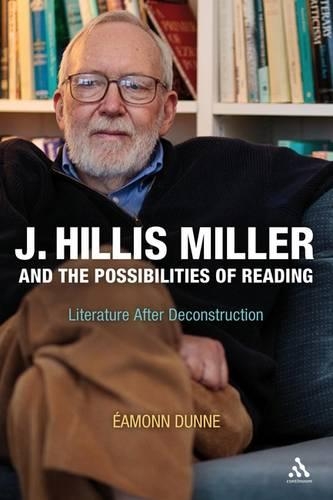
J. Hillis Miller and the Possibilities of Reading: Literature After Deconstruction
(Hardback)
Available Formats
Publishing Details
J. Hillis Miller and the Possibilities of Reading: Literature After Deconstruction
By (Author) Dr Eamonn Dunne
Continuum Publishing Corporation
Continuum Publishing Corporation
8th July 2010
United States
Classifications
Professional and Scholarly
Non Fiction
810.9
Physical Properties
Hardback
176
Width 156mm, Height 234mm
Description
Reviews
"J. Hillis Miller is very likely the most happily influential critic of the last fifty years, issuing provocative book after book and conducting his prodigious education generously right before our eyes. Eamonn Dunne's study is a wonderfully responsive, careful but by no means reverential discussion of some of Hillis' leading preoccupations and their lasting implications. The book is especially useful in its analysis of the ethics of reading, of various shades of irony, and, most generally, of what happens when we read and write about what we love." -- James R. Kincaid, Aerol Arnold Professor of English, University of Southern California, USA.
"Sustained studies of J. Hillis Miller's pivotal role in the innovation and dissemination of critical theory over the past half-century are long overdue. Miller has been a polymath and decisive contributor to the field: as an early bellwether to European phenomenology and the criticism it inspired; as an exemplary collaborator and catalyst to the critical styles and interventions of Paul de Man and Jacques Derrida. But most importantly, as an inexhaustible and thoroughly innovative critic in his own right, whose readings of key literary and philosophical texts bristle with authenticity to their specific contexts and ethical inevitability. Miller is an equal partner in the exemplary intellectual exchanges he sustained with de Man and Derrida in such openness and generosity. His work, in its protean reformatting and relentless self-reconfiguration, is reminiscent, above all, of the sustained mindfulness Maurice Blanchot directed toward twentieth-century letters. Eamonn Dunne's J. Hillis Miller and the Possibilities of Reading fully rises to its own formidable critical occasion. It is far less a recapitulation of the stations along Miller's way than a stunning constellation of major critical improvisations that Miller made with such regularity--among them his commanding understanding of speech-acts and performatives, his fractal reading of Proust, and his uncanny mobilizations of misreading, telepathy, and cryptonymy--that without Dunne's active complicity we might lose sight of them. "Dunne amply evidences Millerian virtuosity as a reader in the muscular compression with which he reconstitutes and arrays a sequence of stunning innovations that Miller contributed under battle conditions of the critical wars. In so doing, he furnishes a striking and enduring transcript of what goes right when critical penetration and devotion find inspiring philosophical paradigms, auratic cultural artifacts, and a cadre of brilliant co-equals in the collective programming of critical rigor."-- Henry Sussman, Visiting Professor of Germanic Languages and Literatures, Yale University, USA
Dunnes book unfolds between fascination and research. Its achievement is to have sustained and suspended the one by the other, to have let each hold open the future of the other. As a result, the future of the J.H. Miller studies has never looked so bright. -- Peggy Kamuf, University of Southern California * Comparative Literature Studies, Vol. 50, No. 2 *
Author Bio
Dr amonn Dunne is a teacher of English at Coliste Chraobh Abhann school in Kilcoole, Co. Wicklow, Ireland. He is the author of J. Hillis Miller and the Possibilities of Reading: Literature after Deconstruction (2010) and has research interests in pedagogy, popular culture, queer theory and narratology. He is currently co-writing a third book on queer theory and literature with Michael ORourke.
